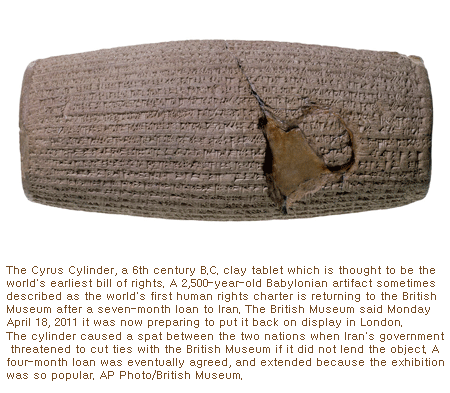The Cyrus Cylinder, a 6th Century B.C. Clay Tablet Returns to British Museum After Iran Loan 
LONDON (AP).- A 2,500-year-old Babylonian artifact sometimes described as the world's first human rights charter was returning to the British Museum Monday after a seven-month loan to Iran.
Hundreds of thousands of people viewed the Cyrus Cylinder while it was on display at Iran's National Museum.
The clay cylinder carries an account of how the Persian king Cyrus conquered Babylon in 539 B.C. and restored many of the people held captive by the Babylonians to their homelands.
The British Museum said the artifact would go back on display in its ancient Iran gallery on Tuesday.
The cylinder caused a spat between the two nations when Iran's government threatened to cut ties with the British Museum if it did not lend the object. A four-month loan was eventually agreed, and extended because the exhibition was so popular.
British Museum director Neil MacGregor said he hoped to agree future loans with Iranian authorities.
Speaking in Tehran on Saturday, he said such cultural exchanges "are especially important in the complex, often hostile, world we live in today."
Diplomatic relations between the two countries have been strained by Iran's disputed nuclear program, which Britain and other Western countries believe is being used to develop nuclear weapons. Iran also has accused Britain of supporting anti-government protests in 2009 postelection turmoil, a charge London denies.
The Cyrus Cylinder is often called the world's oldest human rights document, although it was common in Mesopotamia for kings to begin their rule with such reform declarations.
